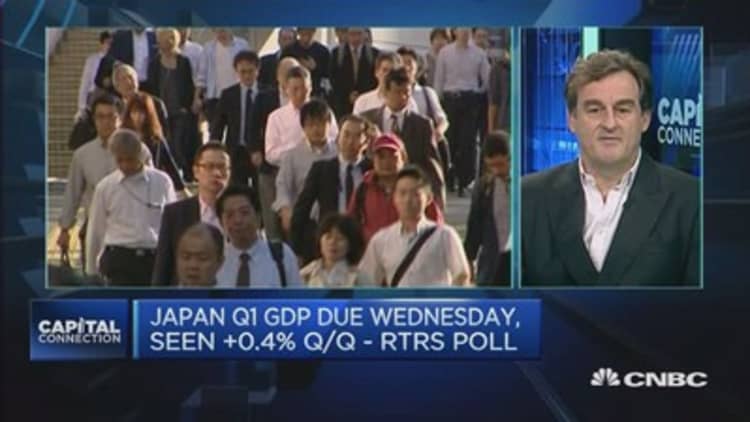Hit by a tax hike, lower real wages and higher prices, Japanese households have been cutting back on spending, and the GDP data on Wednesday is expected to confirm they are holding back economic growth.
"Real wages have fallen by around four percent since Prime Minister Shinzo Abe came to power and household spending will be the big swing factor for economic growth going forward," Capital Economics' Japan economist Marcel Thieliant told CNBC by phone.
Just when a weaker yen had been pushing up the cost of imported goods, Japanese consumers were hit in April 2014 by the first consumption tax hike in seventeen years.
In response, Japan's households have been slashing their spending and unwittingly helped tip the economy into a technical recession from which it has struggled to emerge from.
Gross domestic product (GDP) data due Wednesday is expected to show the world's third-largest economy grew and annualized 1.5 percent for the three months ending March 2015, unchanged from October-December's revised reading. The economy contracted in both the second and third quarters of 2014.
"Household spending is the chief factor holding back economic growth and there is no sign of consumers starting to spend again," Mizuho Securities' chief market economist Yasunari Ueno told CNBC by phone. "And nothing, not exports nor investments – not even public investments, is compensating for the weakness in consumer spending," he said.
Tight-fisted Mrs. Watanabe
So far, the data suggest that Mrs. Watanabe has no intention of loosening her tight grip on households' purse strings.
In the three months following the April 2014 tax hike, consumer spending contracted by five percent quarter-on-quarter, and only inched by 0.3 percent and 0.5 percent in the two following quarters, respectively.

But between January and March 2015, consumer spending will again stagnate and come in flat on a quarterly basis, according to Nomura's May 1 GDP preview note.
It's not only higher taxes that are biting, however. The government's economic policies have also been pushing up the price of imported goods.
Prime Minister Abe's policies, dubbed Abenomics, have sharply depreciated the yen and helped boost profits at Japan's blue-chip exporters, but also driven up the cost of everyday shopping items.
No relief ahead
In theory, the weaker yen and collapsing oil prices were supposed to have positive effects too: the cheaper cost of importing oil would help lift economic growth and trigger a virtuous cycle of higher prices driving up wages, according to the government's scenario.
Instead, the rising cost of food may cancel out any benefits of cheaper oil prices. In the meantime, the hoped-for wage increases have failed to materialize, analysts said.
If anything, the belt tightening by households may only be depressing capital investments in the services sector, which generates over 70 percent of Japan's GDP, according to World Bank data. Real capital investment may have fallen fell by 0.2 percent in the last quarter of fiscal 2015, according to Nomura.
With few signs that Mrs. Watanabe will start spending again anytime soon, economists are keeping their growth targets for the next fiscal year through to March 2016 at modest levels.
Mizuho's Ueno, who sees a "cloudy" outlook for the economy, forecasts GDP will grow by just 0.7 percent.
Capital Economics' Thieliant has the growth rate at 0.8 percent, which he sees as "reasonable, in a country where the working age population is shrinking by 1.5 percent a year."
Correction: An earlier version of the article stated that Capital Economics' forecast for fiscal 2015 was 1.5 percent. The forecast for fiscal 2015 has been corrected to 0.8 percent.

